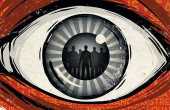SarahPhilip
I'm a freelance writer and copywriter.
Contributor II
- Lurker
- Sharp-Eyed Citizen
- Article of the Month
- ?
- Articles
2 - Featured
2 - Comments
19
- Ext. Comments
6 - Processed
10 - Revisions
9
- Topics
3 - Topics Taken
2 - Notes
4
- Topics Proc.
4 - Topics Rev.
1
- Points
1265 - Rank
133 - Score
552
Latest Articles
Latest Topics
Why are gangsters romanticised on screen?In films and TV shows, ranging from 'The Godfather' to 'Peakey Blinders', gangsters are almost always depicted sympathetically. They're the heroes, the people we root for. It doesn't matter how many people they kill, we see them as being justified. But why do we look at them so favourably? It's not as simple as them being the focal point. What almost every gangster film or TV show does is show the excitement and glamour of their lives, often against a bleak backdrop. 'Broadwalk Empire', for instance, is set in the era of prohibition. It's not just that their lives are exciting though. There's this sense that they can do anything, that they have so much power. As much as we might disagree with the violence, the sense that they can do something if someone comes against them is an intoxicating thought. 'The Godfather' perfectly captured the idea of Michael getting payback when someone tried to kill his father. In fact, the whole idea of gangsters as family, whether or not they're related by blood, makes their actions more sympathetic. There's a sense of loyalty between all of them that is heightened because they are always in life or death situations. This in turn makes betrayal, even worse. Discuss how and why films and TV shows glamorise gangsters.
|
Romance novels - too easily dismissed?Romance novel are often looked down on and seen as somehow inferior. Chick lit is a name that has negative connotations. It suggests something trashy or throwaway. Even Jane Austen, whose books are considered classics, is criticised for not concentrating on weightier issues. But why are romance novels so easily dismissed? Is it because it's mainly a genre written by women? Is it literary snobbery for something that is so popular? Romance, after all, is an important part of everyone's life. Most people either get married or live together. Obviously not all romance novels can be of the same calibre but many are well written and engaging. So there does seem to be an unfair tendency to criticise romance novels. Look at this idea in terms of classic authors like Jane Austen and modern day authors like Diana Gabaldon or Nicholas Sparks.
|
Is 'the evil twin' merely a lazy stereotype?The evil twin is, at first glance, a predictable trope where pure villainy is set against the heroism of the central protagonist. Evil is subsequently only something that is external to our hero. But is this all there is? Does having an evil twin make the hero confront another side to himself? What does it mean for the viewer to see someone who looks exactly like the hero we know behave in a completely different manner? Does it make us reevaluate his behaviour, think about what circumstances could make him turn to the dark side? Or is this all negated by the disappearance or death of the evil twin and a swift return to the status quo?
|
Latest Comments
| Dystopia: Hope in the Face of a Seemingly Impenetrable System | |
I know – I also only discovered it recently. It’s such a shame that so many non-english books so often don’t get the attention they deserve. | Dystopia: Hope in the Face of a Seemingly Impenetrable System |
It’s so true. People talk abut books being escapist but most books, even if they’re exploring a fantasy world, force us to confront issues that face us in the real world. Dystopian novels are just more blatant about it. | Dystopia: Hope in the Face of a Seemingly Impenetrable System |
I love her too. She is a truly formidable character that is stronger than a lot of female literary characters today. The Bolshevik idea was that men and women were supposed to be equal, even if this didn’t work out in reality. So I-330 is, at least in part, based on those ideas. | Dystopia: Hope in the Face of a Seemingly Impenetrable System |
I enjoyed your discussion of how there can be different possible scenarios through time travel. There’s a show called ‘Timeless’ that explores the problems you could cause by changing the past. The heroes try and stop a man who wants to change the past but ultimately just be being there, they always change something. | Time Travel: The Literary Way To Wander |
Great article. There are too many sexualised female characters. I always loved the X-Men comics because there were so many women in the team. Some of them did wear tightly fitted outfits but, in general, they were a lot more covered up than most female superheroes. There was a real sense that the male and female mutants were equal. All the female characters had such power and one of the most famous stories was focused on Jean Grey and her transformation into the Phoenix. They even touched on female sexuality. Rogue was a character who, as much as she flirted and wore spandex, had to be completely covered up and couldn’t touch anyone. | Sexism, Impracticality, and the Hopeful Future of Costuming |
You’re right. As much as we might criticise editors for not showing us exactly what’s happening, they are great at their job. There are so many reality tv shows that get millions of viewers, especially compared to more traditional dramas. | The Enhanced Reality of Reality TV |
That’s so true. On social media you are your own producer and editor. You show a particular image of yourself. In fact, social media is connected to reality tv in many ways. The rise of reality tv parallels the rise of social media particularly with so many people discussing these shows on various platforms. What’s more, many reality tv stars extensively promote themselves on social media. | The Enhanced Reality of Reality TV |


It’s true. Even though Montag suffered and was run out of town, he was fulfilled in a way his wife wasn’t. There was some part of her that knew that otherwise she wouldn’t have kept overdosing on drugs. In ‘1984’ Winston does become an automaton in the end, but his greatest happiness comes when he defies the state.